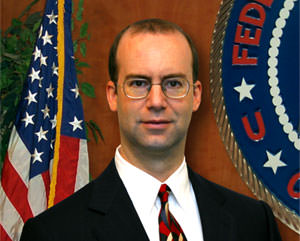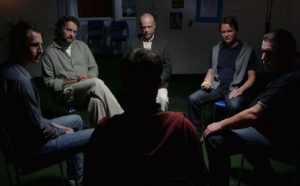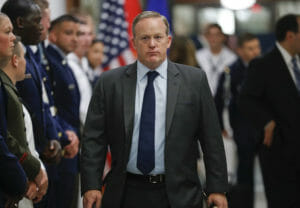FCC Commissioner on Net Neutrality, the Future of Media and More
Jonathan Adelstein, one of five FCC commissioners, speaks with Truthdig about the battle to control America's airwaves, the value of an open and fair Internet and his initial thoughts on the XM-Sirius merger.
Jonathan Adelstein, one of five FCC commissioners, speaks with Truthdig about the battle to control America’s airwaves, the value of an open and fair Internet and his initial thoughts on the XM-Sirius merger.
Listen:
(running time: 16:10 / 14.8 MB)
Transcript:
James Harris: This is Truthdig. James Harris here sitting down with Josh Scheer, and on the phone we have one of five FCC commissioners, Jonathan Adelstein, on the phone. How are you doing today, Jonathan?
Jonathan Adelstein: I’m doing great. Thanks for having me.
Harris: Our pleasure. There’s a lot going on with regard to FCC and media deregulation and there’s this talk of the XM-Sirius satellite companies merging. There’s a slumping, as I see, in traditional media form, whether it be television or radio. And there’s always continual questions about media ownership. I want to know, what do you see as the most pressing issue for the FCC today?
Adelstein: Well, the most pressing issue is making sure that people have information from a wide diversity of sources, and that requires, I think, dispersed ownership of some of the media properties so that some of the minorities, for example, can own outlets. Women…. Right now minorities are 30 percent of the population but only 3 percent of the TV broadcast licenses. Women, as we all know, are over half the population but only 5 percent of licenses. So no wonder people complain that the portrayal of women and minorities in the media tends to be either stereotyped or ignored and underrepresented completely. That’s just one of the issues. But think about the importance of getting a real debate going, and not only in the traditional media but on the Internet as well. And when it comes to the Internet, I think the issue there is keeping the Internet freedom alive and keeping the openness that has been the long hallmark of the Internet, what some people call “Net neutrality.”
Harris: Now, how do you do that? Obviously, these companies like Fox, the big players, CNN, whether it be the networks: CBS, NBC…. They are owned right now. How do you open up the gateway and allow minorities — whether it be women, whether it be Latinos, whether it be blacks — how do you allow them ownership possibilities?
Adelstein: Well, the first step is making sure we don’t have further media consolidation until we deal with that issue. Right now a lot of the big media companies are asking to allow us to loosen the rules so they can get even bigger, they can buy more outlets. Now, if you allow these large, deep-pocketed companies to buy out even more small, local outlets, the price just goes up and they get even further out of the reach of minorities and women. So, step No. 1: Do no harm. And, No. 2, we need to make better efforts to make sure that the information is out there. In the last media ownership review in 2003, then-Chairman [Michael K.] Powell eliminated the only rule that was designed to help minorities find out about stations that were going up for sale. We were actually condemned by the Third Circuit federal court about doing that, in that we weren’t upholding the requirements to avoid discrimination. I mean, it’s shocking that we would be — in this millennium — chastised for not doing all we can to prevent discrimination. So there’s a whole bunch of ideas that a diversity committee has come up with. We’ve got to be more creative in ways of getting these in the hands of folks, but we’ve got to start by not allowing further media consolidation until we deal with it.
Josh Scheer: How much media consolidation has taken place? I don’t think many people know this. It’s hard to find these kind of stories. What would you say? How much is owned by a small group of people?
Adelstein: Well, the top five companies in the country — some studies show — control as much as 75 percent of what people see and hear in the broadcast media. The giant conglomerates that own so many of the outlets and so much of the material. And they, of course, also have their own websites that people flock to that are the largest, most powerful Internet portals. So there’s a very small group. Even though there’re 300 channels on, the vast bulk of them, especially the ones that are the most popular, are controlled by the handful of media giants that already have a big voice in this country. And our thought is, “Let’s make sure that others can have a voice as well.” The Internet makes that possible, but the fact is that people still tend to look at broadcasts and newspapers as their primary source of news and information and the real driving force that controls the discourse in most communities across the country.
Scheer: Now how do we change people’s opinions? Because, I think I suffer from that a little bit, too. I like the and I read it, but I still look to CBS or I still look to CNN or a book, to kind of find the “true story,” whereas you see it on a website sometimes you take it with a grain of salt. How do we change that? How do we let, say, a citizen report — and it may be just as accurate — how do we let people get in and maybe report stories, or like, say, the [political] conventions or anything like that? How do you see that shaping up in the next few years?
Adelstein: Of course there’s nothing wrong with traditional media outlets having real journalists cover these stories in depth. Outlets that we can trust. We just want to make sure that there is enough variety that people can make up their own minds about the issues of the day and not have them determined by the handful of media giants. There is a real benefit to having competition and diversity. There is not as much of that as there could be, even though there are all these different opportunities, all these different channels. And the kind of clutter that people are dealing with these days, there are so many different options, but it seems that the ones that they actually turn to are controlled by a handful of folks. So we need more voices on the air, but not just controlled by the same ventriloquists.
Scheer: [Chuckles]
Harris: Bill Cosby — I don’t know if you’re familiar with this, but in the ’80s, was really looking strongly at buying NBC, looking at buying the network, putting together the necessary funds. There’s been this conversation about blacks, and about Latinos even, buying major stakes in networks for about 20 years now. My question is more about you being an insider there. Will the oligopoly always win? Do you ever feel like you’re up against a wall and you’ll never really make any effect on diversity in media?
Adelstein: Well, we do feel like we’re constantly under the gun. Remember we’re up against here the most powerful media companies, some of the most politically powerful companies in America and in the world today that are pounding on our door, asking for more relief. And, frankly, it’s an amazing victory that we had in 2003 when the [FCC] chairman did the bidding of these big companies and proposed, actually, final rules that would’ve allowed them to get much bigger, and the whole issue got thrown out in the courts, partly because of the public uproar that resulted from them, partly because Commissioner [Michael J.] Copps and I laid out a real reason why these rules were inconsistent with the public interest. And now the whole issue is back in our plate again, the whole question of media ownership that we basically won in the courts in 2003 is back in our lap. We have to start from scratch, and we’re doing it under a whole new environment, where the politics of this have shifted, partly because of the election of 2006 to some extent. But the … issue of allowing media companies to get even bigger is somewhat radioactive, politically. There’s bipartisan concern about it, the public is up in arms about it, we have new organizations, like Free Press, that are widely organized. And the public is much more sensitized to this. It’s kind of like when you become allergic to something after taking a lot of it. You become very sensitive to it. And the country has gotten a little bit allergic to media consolidation, which is a healthy thing. It is an allergy. It’s something that upsets public, as well it should. So we’re in a much better position now. So I feel … we have a good win under our belt. Now the win is preventing something from getting worse. And you’re saying, “Now what do you do to make it better?” Well, it is a daunting challenge. But then again, I don’t think, if you look back in 2002, anybody thought we could have completely stopped the effort by these companies to allow themselves to get much bigger. And here we are in 2007 and no relaxation of the rules has occurred thanks to the efforts of not just us but a whole mass movement that emerged. So I’m hopeful that with real continued pressure on this issue we can move the ball forward, we can put the issue of diversity and minorities and women on the front burner. We can hope that somebody doesn’t have to be Bill Cosby or Stevie Wonder to own a radio or a TV station. We want to make it possible for small businesses to have their voices heard in broadcasting and we’re going to keep up the fight. We’ve won before, so we’re more optimistic that maybe in the long run we can win again.Scheer: Now, this is a public issue, as you’ve just talked about. Free Press and people…. No one gets hurt by an open media, Republican and Democrat alike. So why was Michael Powell allowed to do this? Why did Congress allow him to do this, and will it really change with this [Democratic-controlled] Congress? Are they tied in to, maybe, campaign contributions from these big media companies? Is there any change except if it’s by groups like Free Press?
Adelstein: Well, I’m going to tell you what happened in 2004, which a lot of people forget, is that the Senate voted on a bipartisan basis to veto everything that the FCC had done, voted 55 to 40 under Republican control of the Senate, bipartisan vote, to reject it. That was the vestige of the old Newt Gingrich “contract on America” where he wanted to authorize a program for rolling back Clinton-era regulations. That procedure, in Congress, had never been used against deregulation. This is the first time that happened, and there was a huge vote against media consolidation. In the House, my understanding is there were the votes there, the majority would’ve voted along with the Senate, but the leadership, then-Majority Leader Tom DeLay, made sure that this wouldn’t come up. But there’s no DeLay to delay anymore. Now there’s a different . . . wind of change has blown through the House, and I presume that if there was another attempt to overreach, that Congress could again vote to override whatever the FCC would do to permit further media consolidation. So it’s really an uphill battle, which is a complete turnaround from the earlier days, for those who are advocating further media consolidation. And it’s a bipartisan issue. I think if the thing came to a vote in the House, you would see a lot of Republicans joining almost all Democrats in voting to stop media consolidation. And that’s something I think that gives everybody on the commission here pause. We don’t want to go down that path again. It’s pretty embarrassing to have a vote here on the Commission and have it slapped down by the US Senate on a bipartisan basis only months later.
Scheer: Now, you’re saying they’re not tied, maybe, to these corporate giants. ‘Cause, you know, in other fields, campaign contributions are so large that it sways them. Do you think the public has made such an outcry that maybe congressmen are listening on this issue?
Adelstein: They seem to be. One of the few victories of the people over the powerful in this millennium, in the last several years, was the victory of the media democracy movement over the media giants. It’s a real, palpable victory. And it is surprising in a lot of ways because there is a lot money, there’s a lot of power. It’s not just money; it’s the ability to get on the media, which is the lifeblood of politicians. I mean, imagine the kind of bravery it took for all those members. Remember, not everybody was brave: you had 55 to 40, you still had 40 voting against it. But getting a bipartisan vote like that is a victory by any stretch. And in the House I think it would be even stronger if it came to a vote this time around.
Scheer: The way I figured it, back in the day — now, I haven’t studied up on the issue recently, but you guys do not control the Internet. Do you think the Internet, because of that, is going to allow for more freedom than even broadcast cable will ever allow?
Adelstein: Well, it has so far. There’s nothing that’s more democratized the discourse in this country than the Internet. Most people still turn to broadcasting and newspapers when they want to find out things. When they go to the Internet they often go to their local newspaper dot com or their local TV station dot com. But they have other alternatives. They have the ability to communicate with themselves, as we were talking about earlier. People set up their own websites and they do their own reports. And those are all helpful news sources. The key is to make sure that we don’t allow what happened to media to happen to the Internet, that we don’t allow big gatekeepers and a handful then to dominate the flow of information. So we’ve made an effort, Commissioner Copps and I in particular here on the commission, to keep the Net neutral, to keep Internet freedom alive. And we were able to accomplish that, to a great measure, in the AT&T/Bell South merger, where we got the new AT&T, the largest wireless, broadband and wireline company in the country, to agree to significant network neutrality requirements that make sure that they don’t prioritize or degrade any content flowing across the Internet, particularly in the [so-called] last mile. So we’ve been able, again, to have a victory there, and I think we’ve proven that we can define that neutrality. And so far we haven’t seen any violation of that agreement, and I’m hopeful that we can keep the Internet free.
Harris: Speaking of gatekeepers, I’d love to hear your thoughts on the potential or proposed XM-Sirius merger. Because what you have here, you talk about waves that are independent and free of the traditional form. But here you have this new satellite, these two new competing companies that provide, for about 12 to 15 million listeners, a diverse body of content…. When you talk about putting these two guys together, are you talking about consolidation just for another platform? Is this good for the public interest for these two companies to come together?
Adelstein: Well, that’s what we’re evaluating right now. The FCC has to find it’s in the public interest in order to approve it. So I have to be very careful about talking about it since I sort of sit as the judge and jury, to some extent, of that merger. All I can say is, I’m a huge fan of satellite radio. I think it does bring diversity of viewpoints and music and thought into the airwaves. It’s one of the great success stories of the FCC, permitting that. And it’s also, I think, provided a real alternative to terrestrial radio that’s made terrestrial radio, the regular radio broadcasters, more responsive and kind of kept their feet to the fire to make sure they’re delivering some interesting local programming so that they can fight against the ears … and they can get heard, and people don’t flock to satellite radio. So we’ll see what the public interest benefits are as we’re analyzing it. We’ve just gotten the early filing so far and I haven’t reached any final conclusion yet.
Harris: Well, perhaps we can talk to you after that decision goes public. That would be great if you had the time and were willing.
Adelstein: I would love to. Absolutely.
Scheer: And I would also love to talk another time about Net neutrality because I know that’s a big issue, too. Not just media ownership, but keeping the Net free and safe.
Adelstein: That is one of the great issues of our time. If we can keep the Internet open, the way it always has been, it can be one of the greatest sources for democracy and for information flow. We’re seeing that already with user-created content, with things like YouTube. People can be their own news gatherers, their own producers…. It really is a wonderful fount for creativity and innovation. And as long as it’s open, it’s going to continue to be, and that’s our job here to make sure that it stays open.
Harris: Well, Jonathan, I gotta imagine you sometimes feel like a teacher in that your students or constituents never say “thank you.” But what you do at the FCC is of grave importance to Americans and to people that watch the news and watch media in general. So, keep up the good work, and keep fighting the good fight.
Adelstein: Well, that means a lot to me. Thanks so much for saying that. And I certainly will.
Harris: There you have it. Jonathan Adelstein, one of five FCC commissioners. Thank you for joining us. For Jonathan, for Josh Scheer, this is James Harris, and this is Truthdig.
Your support matters…Independent journalism is under threat and overshadowed by heavily funded mainstream media.
You can help level the playing field. Become a member.
Your tax-deductible contribution keeps us digging beneath the headlines to give you thought-provoking, investigative reporting and analysis that unearths what's really happening- without compromise.
Give today to support our courageous, independent journalists.




You need to be a supporter to comment.
There are currently no responses to this article.
Be the first to respond.